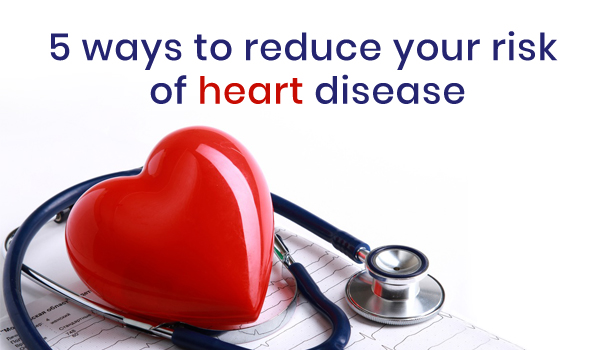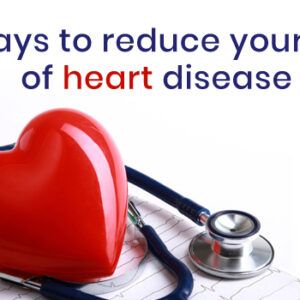
The cardiovascular system is an important system of the body. The cardiovascular system pumps blood to the body which is nutrient-rich and has oxygen. Oxygen is the fuel of the body which makes (ATP) energy for the body. If the cardiovascular system failed then you can’t function properly because the blood supply to all organs became impaired and even death may occur because of cardiac arrest. So it’s very important to take care of your cardiovascular system and prevent it from diseases. There are many cardiovascular diseases like coronary artery disease, congestive heart failure, heart attack, valvular heart diseases, abnormal heart rate and rhythms, cardiomyopathies, deep vein thrombosis and pulmonary embolism.
So here are 5 steps to reduce the risk of cardiovascular diseases:
Eat a Heart-Healthy Diet
You may observe that doctors always advise heart patients to fat and cholesterol-free diet. Our diet is really an important factor in heart health. An unhealthy diet is one of the major risk factors for cardiovascular diseases. High cholesterol intake, sodium-rich diet and high amounts of sugar, all are unhealthy for the heart and cause many heart diseases. So to decrease the risk of cardiovascular diseases you must take fruits, vegetables, beans, nuts, legumes, a high fibre diet and oily fish to become free of heart diseases.
Exercise Regularly
People who don’t exercise are more prone to heart disease than those who exercise regularly. Exercise is also a vital factor for good heart health. Make physical activity a part of your daily routine, you can use an activity tracker to check your daily activity status and it also motivates you to increase your physical activity.
“One of the key benefits of exercise is that it helps to control or modify any of the risk factors for heart disease,” says Dr Kerry Stewart, director of Clinical and Research Exercise Physiology at Johns Hopkins Bayview.
Exercise lowers blood pressure, decreases the workload of the heart by increasing muscle’s ability to take oxygen from the blood and also decreases the risk of developing diabetes.
Get Regular Health Screening
High blood pressure and high cholesterol are the enemies of the heart and blood vessels. But regular screening helps you to know the number and risk and helps in prevention.
Blood pressure Screening: blood pressure can be checked from early childhood. Blood pressure must be checked once every 2 years to the screening for high blood pressure because hypertension is a major risk factor for heart disease and stroke. The normal blood pressure for adults is 120\80 mmHg.
Cholesterol levels: cholesterol screening starts at the age of 20 but if you have a family history of hyperlipidemia then you must screen for cholesterol earlier. Adults must screen once every 3 to 6 years.
Diabetes Screening: Type 2 diabetes screening starts at 45 years of age but if you have risk factors for diabetes like being overweight or positive family history then must do screening at an earlier age.
If you have a condition of the above-mentioned factors then you must consult your doctor or physician for lifestyle changes and precautions and medications.
Quit Smoking
If you are a smoker then you have twice the risk of developing cardiovascular diseases than non-smokers. Smoking can kill a person if ones had a heart attack. Cigarette smoke reduces the oxygen level of blood and makes it hard for the heart to pump. The heart pumps much harder to meet the oxygen demand of muscles and brain and this can increase the blood pressure and heart rate, which is unhealthy for the heart. When you quit smoking then the risk also drops for heart disease and it’s really good news for smokers.
Get Enough Sleep
Sleep deprivation also affects heart health. Over time insomnia can lead to depression which causes unhealthy lifestyles, physical inactivity and unhealthy food choices. So sleep deprivation cause high blood pressure and hurt your heart. It’s better for heart health to maintain a good sleep-wake cycle. If you are unable to sleep at night you must try sleeping techniques, a dark environment and sleeping exercises to induce sleep.
Conclusion
Cardiovascular diseases are the leading cause of death. By following a heart-healthy lifestyle you can prevent many heart diseases. Although there are many factors which are non-modifiable risk factors for heart diseases you can prevent the risks by following the above 5 mentioned steps. So get started with the above 5 steps to boost your heart health and live longer.
